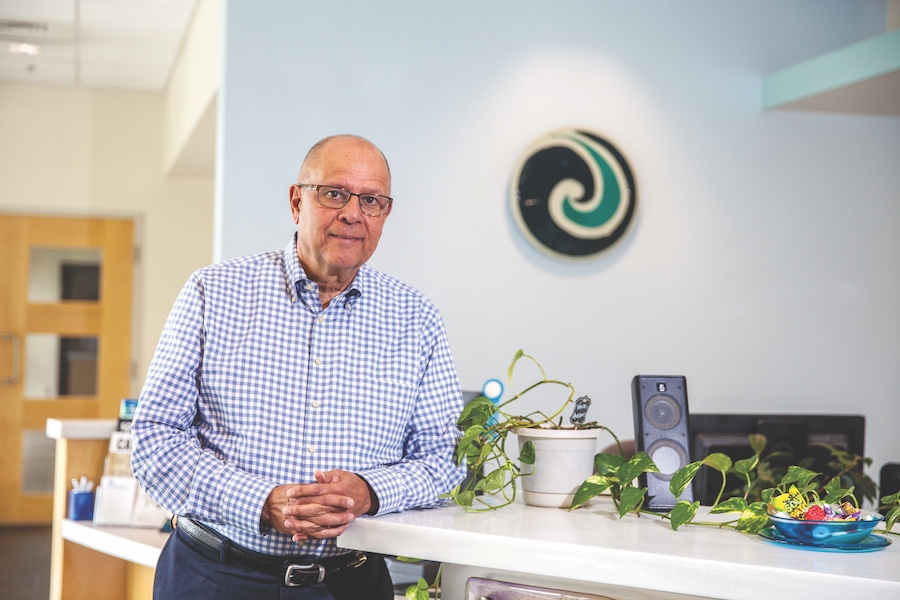Brand Story -Eighty five years later, PacificSource’s original values continue to drive its impact and growth.
PacificSource, an independent, not-for-profit community health plan based in Springfield, OR, has grown from 100 to over 1,000 employees in the last twenty years. In that time, it’s gained licensure in four states and has increased its coverage from 60,000 to over 280,000 members. Its transitioned from commercial coverage to also include Medicare and Medicaid, with established partnerships now estimated at over 46,000 physicians and healthcare providers.
Yet Ken Provencher, PacificSource CEO since 2001, would be loath to tell you any of this.
Humility has been a guiding tenet behind Provencher’s leadership, as well as a core value of PacificSource’s culture. “Humility is something we assess when we hire people and when we assemble our executive team,” said Provencher, the company’s fifth-ever CEO. “When you approach things with humility, you’re better at solving problems and you’re an effective collaborator. Ever since the beginning, it’s how we’ve run our business.”
PacificSource’s humble approach is also the primary reason why the company is celebrating its 85th year in business.
 Headquarters
Headquarters
PacificSource began in 1933, founded and governed by 21 physicians who wanted to provide better access to healthcare for Lane County residents. Originally called Pacific Hospital Association, the organization operated on two simple tenets. The first is establishing effective provider-partner relationships. The second tenet is maintaining a strong focus on improving community health.
Though PacificSource has seen many changes since its founding, its original guiding principles remain unchanged. “We’ve built our strategy on three principles: community, partnership, and member experience,” said Provencher. “If you look at us 85 years later, we’re still focused on those same critical elements.”
Adhering to such values remains critical for PacificSource’s longevity. In an industry that is notoriously volatile, with constantly evolving regulations, market fluctuations, mergers, and contentious competition, surviving as an independent insurance provider for 85 years is almost unheard of. Yet, PacificSource has continued to thrive.
For one, PacificSource’s community-based, not-for-profit model allows the company to keep a broad view on who its stakeholders are. Even deeper, PacificSource has stayed true to its mission, values, and guiding principles, a commitment which, according to Provencher, has been the secret to PacificSource’s long-term success. “Knowing who you are and staying committed to what makes you effective are good principles for operating the business,” he said. “Along the way, we’ve developed discipline and made sure the organization remains on stable footing, all so we can continue to do great things.”
 Training session
Training session
One of the “great things” Provencher is referring to are PacificSource’s Coordinated Care Organizations (CCOs), formed with the goal of improving access and social determinants of health in underserved communities. Two have been developed thus far—in the Columbia Gorge and in Central Oregon—and each have a council consisting of representatives from major health providers, community entities, and local consumers, all of whose input set the direction for the CCO.
Beyond improving underserved communities, the CCOs demonstrate another facet of PacificSource’s mission—facilitating services that go beyond insurance. For PacificSource, this means providing financial and volunteer support to local charities (since 2013, Pacific Source has shared over $30 million with communities), approaching healthcare with a preventive mindset, and always going the extra mile in serving its members. Or, as Provencher otherwise puts it: “doing the right thing.”
“I come from an approach that says, ‘If you do the right thing, it’ll turn out to be good business,” said Provencher. “This may cause some pain right now, and we may have to do something that could negatively impact the bottom line, but in the long run, it’ll be beneficial not just in who we serve but for general business.”
One company-wide example was in the 1980s. Due to a turbulent economy, many insurance companies were consolidating into larger plans. However, PacificSource’s board was committed to serving its existing market directly and could only do so by remaining independent. “The decision wasn’t idealistic, just what made the most sense at the time,” said Provencher. Thus, the opportunity to merge was rejected.
 Community garden
Community garden
Yet by that point, PacificSource’s members extended beyond the local community and into the surrounding counties. The company had to adopt a larger view in order to serve its broadened member population, which eventually led to its expanding into a regional company. And while the board couldn’t see it at the time, that decision to remain independent—although difficult—became a milestone moment in the company’s growth.
The company has experienced steady growth ever since. When Provencher became CEO in 2001, he and his team began implementing long-term strategies without the expectation of immediate results—expanding into new markets and government sectors, advancing technology and embracing analytics, diversifying opportunities and revenue models, taking on an increasing role in building population health, and developing more robust partner-provider relationships.
More than a decade later, PacificSource’s strategies have started to bear fruit—one definitive example being its landmark partnership with Legacy Health.
 Fitness studio
Fitness studio
In 2015, Legacy Health purchased a 50% member interest in PacificSource, creating a new organization with its own board of governance. “This partnership is a huge expression of who we are, and fits very well within our trajectory,” said Provencher. The agreement means a more integrated delivery between healthcare services and insurance coverage, with the ultimate aim being to control costs and ensure superior patient outcomes.
The collaboration also signified a revolutionary provider-partner relationship. Traditionally, health plans and health systems may have had overlapping values, but the relationship often stayed contractual. Instead, Legacy and PacificSource recognized their strong mutual alignment and created a more cohesive, longstanding partnership than what’s existed before.
Since the transaction, both Legacy and PacificSource members have seen immediate dividends, including increased access to care and uniquely designed health plans. While the model continues to develop, Provencher is excited by what’s to come. “This relationship allows us to explore broader issues, such as housing, poverty, education—all of which can provide affordable and accessible healthcare,” he said. “With our combined resources, we’re creating the foundation for a seamless member experience.”
 Conference room
Conference room
However, Provencher does not expect overnight results. The partnership will be developed through continuous improvement and open communication, values which extend beyond this venture and into all areas of operation.
Eighty five years is an impressive achievement, and Provencher continues to focus on the future. While his goals are ambitious, he relies upon a proven track record and a steady set of values to guide him forward. “Our values define not only who we are, but who we want to be,” said Provencher. “We’re proud of who we are and what we’ve done. But no matter what we’re doing, we can always do better.
Brand stories are paid content articles that allow Oregon Business advertisers to share news about their organizations and engage with readers on business and public policy issues. The stories are produced in house by the Oregon Business marketing department. For more information, contact associate publisher Courtney Kutzman.




